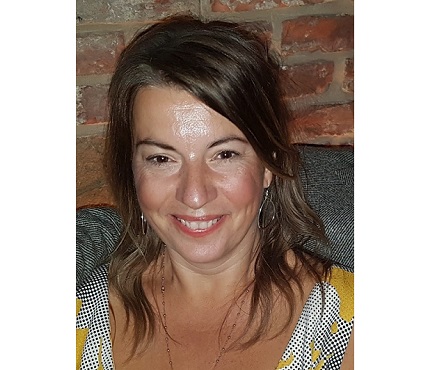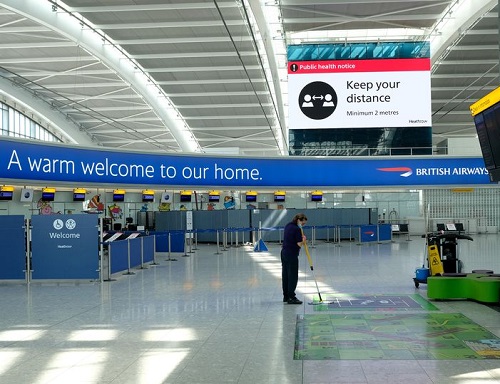Coming home to Heathrow: a health and safety career
Case Study: Amanda Owen
NEBOSH talks to Amanda Owen, Safety, Health and Wellbeing Director at Heathrow Airport about her career, the safety profession and the advice she would give those at the start of their careers

After studying Economics, Security and IT and Law at University, how did you end up working in health and safety?
I first got involved in health and safety when I was about 24 and in my second proper job. I was employed by Superdrug as a Security Analyst but also had responsibility for insurance arrangements; having passed my insurance qualifications in my first job, which was with an IT software company.
My previous employer tried to entice me back by offering me a lot more money. I did not want to leave Superdrug, but the package was very attractive. Co-incidentally the Safety Manager at Superdrug had just resigned, and my manager said he would match the other company’s offer and pay for my NEBOSH Diploma if I took on Health and Safety as well. The rest is history!
What impact did the NEBOSH Diploma have on your career and why did you choose it?
When I studied, it was the only route I was aware of to achieve Chartered status, though there were probably others. I signed up for classroom training combined with assignments because that suited my learning style. It was well-run with excellent materials. NEBOSH’s past chief executive, Teresa Budworth was one of my tutors, and Dee Arp, who is now NEBOSH’s Director of Learning and Assessment, was on my course.
The NEBOSH Diploma gave me a solid technical grounding which is key for any health and safety professional. It also gave me confidence and Chartered status which has meant I have been considered for roles that would otherwise have been out of my reach.
After Superdrug you spent 9 years in aviation before you went to work in other sectors. Why the change and what enticed you back to Heathrow after 12 years away?
The Royal Bank of Scotland (RBS) approached me whilst I was at Heathrow the first time. I wasn’t looking to leave, but I had worked my way up through the company and was unclear what my next internal move would be. RBS offered me my first global role, at the time across 50 countries and 175,000 staff. I had lived in Edinburgh for 3 months when I did my Masters and had loved it. So, a global role, based in Edinburgh was too good an opportunity to turn down.
Whilst at RBS, I was asked to take on Diversity and Inclusion as well as Safety, Health and Wellbeing. To ensure I had a solid foundation for this additional responsibility, RBS sponsored my Master of Laws (LLM) in Employment Law, which I completed at Leicester University.
After 5 years at RBS, I was approached by Bupa for another global role and this time it was a Director level position. My role at Bupa grew beyond health and safety to encompass other risk areas, including financial crime and security.
I’ve worked in many countries including Australia, the US, India, Thailand, Singapore, Hong Kong, the UAE and many European countries. Whilst legislation and maturity vary, health and safety is broadly the same in terms of risk management. To be effective, you must understand the different cultures and how to influence effectively within them. I got a real buzz from seeing my team’s work adapted and translated into different languages and I really enjoyed helping to improve standards in countries where safety was less developed.
After 7 years at Bupa, an organisational change meant my role was at risk. I was offered two other roles, but the situation had made me think about what I really wanted to do next. I decided a big ‘hands on’ safety role should be my next move. When I first saw the Heathrow role advertised I didn’t apply. It was only after I spoke with the (then) Chief Operating Officer that it became an opportunity I couldn’t resist. He explained the Board and Executive’s ambition for world class safety and, at the time, plans for expansion. I am also originally from West London and had enjoyed my days out at Heathrow with my parents when I was little. A lot of people who have worked at Heathrow and leave end up returning and often describe it as ‘coming home’ and that is exactly how it felt for me.
 Can you explain what your responsibilities are in your current role normally, and how this differs at the minute due to COVID-19?
Can you explain what your responsibilities are in your current role normally, and how this differs at the minute due to COVID-19?
As Safety, Health and Wellbeing Director at the Airport the ‘what’ part of my role is to ensure Heathrow understands the hazards that exist, the legislation that applies, has standards and tools in place to ensure compliance with legislation (as a minimum) and that hazards are being managed so they do not cause harm. The ‘how’ part of my job is to work with business leaders and key stakeholders, including Trade Unions and other Heathrow operating companies, to ensure the standards are implemented effectively. My team have a key role in assuring Heathrow’s safety standards are maintained.
COVID-19 is a new and very significant hazard but the principles of controlling the risk are the same. My team and I have had to turn our attention to defining the controls required to operate Heathrow safely during the pandemic and it has been a steep learning curve. We cannot eliminate the risk, only a vaccine or effective treatment can do that, so we are focused on ensuring compliance with Government guidelines and our own risk assessment, to reduce the risk sufficiently so it is safe to fly.
Heathrow has always held safety as its number one value, and it is the first item on board and executive agendas as a result. This focus on safety is one of the reasons I chose to re-join the company. What is new is that the safety of the airport and how it is perceived is critical for passenger confidence to fly and for countries to open their borders to UK air traffic. As a result we have worked through numerous safety issues and have consolidated four terminals into two. At the same time, we have had to ensure the safety of the facilities that are not in use and of course manage all the usual health and safety and fire risks that have not gone away.
How do you think the current COVID-19 crisis will impact the status of health and safety in the short and long-term?
In the short term, health and safety professionals have a crucial role to play in the restart and recovery of almost every industry. I think the crisis highlights that collaboration and communication are important skills for health and safety professionals. Engaging and assuring people are critical now.
Longer term, the COVID-19 pandemic should help to demonstrate the valuable contribution Health and Safety professionals can make to business operations, particularly at times of great challenge. I hope that it will help to elevate the status of our profession, so it is more on a par with other Chartered professions.
What do you particularly enjoy about working in health and safety?
I enjoy making a difference to people by helping to ensure they go home safe and well both physically and mentally. It is great when the Board or Executive recognise the work my team and I are doing, but it means even more to me when a Trade Union representative or a front-line team member thanks us for making the workplace safer.
I love that health and safety is so diverse. I have worked across the globe in many sectors including aviation, retail, logistics and healthcare and have faced different challenges in each. Some of the conundrums I have encountered during my career include how to:
- establish safe cash handling processes for a Bupa branch in Thailand’s sex capital
- create health and safety standards for warehouses full of precious materials in Malaysia
- safely deal with monkey brains discarded on a baggage belt after importers chose to abandon the prohibited item, knowing they would be arrested if they claimed them!
I have also collaborated with some amazing people along the way. A couple of weeks ago I was on a World Economic Forum call with the Deputy Prime Minister of Canada, Finance Minister of Sweden and a Cabinet Minister from Spain. I did briefly think ‘how did I end up here?’
Most importantly though, my career has allowed me to build and lead great teams many of whom are now my friends.
What are the biggest challenges you have faced and how did you overcome them?
My role as a health and safety leader is to effect change through others; driving standards up and incidents down by embedding a safety culture. The key point is ‘through others’. Where I have faced challenges, it has generally been because the people I needed to do something didn’t.
The size, scale and operating model (federated or centrally controlled) of a business are all factors that help determine where decisions really get made but it generally comes down to the people. What are they motivated by, what are their priorities and challenges and who are they influenced by? As my career has developed, ensuring I know how to influence effectively has been a key focus for me.
What advice would you give someone who is considering health and safety as a career?
Qualifications will give you a solid technical foundation, and that’s important. They will also mean you will be considered for jobs that may have otherwise passed you by. What will differentiate you though, is your relationship and influencing skills. Dare I say the theory and the technical knowledge is the easy bit.
Health and safety professionals are change agents; they need to be able to effect change through others. It’s what I always look for when I am interviewing. I’m not interested in a long list of activity; I am looking for impact. What is different because of the person I am interviewing?
I’ve been lucky in my career to have met and worked with some fantastic people. Advice that I have been given, that I have benefitted from and would share include:
- Networks are important - build and nurture yours.
- You can have anything but not everything – what are you prepared to sacrifice for your career? Are you prepared to move away from home, have time away from family when travelling and work long hours when its needed?
- Always have an up to date CV and a ‘Plan B’.
